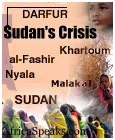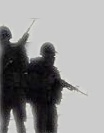 |






 AfricaSpeaks Weblog AfricaSpeaks Weblog
 Rootswomen Weblog Rootswomen Weblog
 Rootsie's Weblog Rootsie's Weblog
|
Time to stand up to America
Posted: Saturday, April 5, 2003
April 5 2003
www.theage.com.au
Britain is not afraid to try to shape US policy. Why, asks Shaun Carney, are we always just along for the ride?
Victory in Iraq is at hand for Australia, Britain and the United States. It could take days, it could take weeks, but this was always going to be the result. As shorthand, we call it a war but it is more accurately an invasion followed by an occupation. It is what you get when the people in charge of the most powerful military apparatus the world has ever seen decide to take over a distant, small, friendless country.
While what is happening now, as the coalition forces accelerate their effort to crush Saddam Hussein's troops, obviously matters - how many deaths do we term "reasonable"? - the crucial issue is how the victors behave in the months after they have captured or killed the Iraqi leader. The early signs are that increasingly the Pentagon and the United States Defence Secretary, Donald Rumsfeld, are succeeding in their bid to supplant the state department as the overseers of post-Saddam Iraq.
You can forget the United Nations. The Bush White House has already ruled out anything but a minor role for the UN in the interim administration of Iraq, and that's from the most moderate member of Bush's executive, Secretary of State Colin Powell.
And what about Iraq's neighbours, Iran and Syria? Bush last year cited Iran as part of an "axis of evil", while Rumsfeld has recently threatened to hold Syria to account after accusing it of supplying military equipment to Iraq. Rumsfeld's behaviour has been so provocative and disturbing that the British Foreign Secretary, Jack Straw - no shrinking violet when it comes to talking tough - this week made a point of asserting that Britain would have "nothing whatever" to do with military action against Iran or Syria.
The attitudes of the two minor coalition members, Britain and Australia, towards the major partner, the United States, are a study in contrast. We know much about British Prime Minister Tony Blair's attempts to keep the UN in the picture as the crunch time for Saddam approached. Blair has been the most passionate and articulate exponent of the argument for taking action against Saddam's regime.
advertisement
advertisement
He was the one who wanted the second UN Security Council resolution authorising a war. He pushed, and hoped, and pushed but ultimately failed. Blair had ended up leading his country into the Iraq adventure alongside the Americans but he took his own path to get there. It was a path that recognised the geographic and diplomatic differences between his country and Bush's.
What do we know about Australia's path to the conflict in Iraq? It does not appear to have been any different to America's. There have been occasional noises of support for the UN, the latest of which came from the Foreign Minister Alexander Downer in Washington this week. Downer was thoroughly chuffed that during his
meeting with US Vice-President Dick
Cheney, Bush and security adviser Condoleezza Rice had turned up and joined in.
According to Downer, that meeting and a series of other meetings gave him an opportunity "to put the case that in the post-conflict environment we would like to see some UN involvement in Iraq. We've been pleasantly surprised by the very positive reception to that message that we've received from the President downwards. I think the Administration knows only too well that there needs to be some UN involvement. That it's crucial to have UN aid agencies involved in Iraq and also to get the IMF and World Bank involved. Indeed, I met with the managing director of the IMF and talked about this with him at some length. So I think there's a growing view here in Washington that some UN involvement in post-conflict Iraq is going to be very important for the future of the country. And we're obviously pleased with that."
Meanwhile, The Washington Post reported this week that Rumsfeld and the military had effectively taken over the Office of Reconstruction and Humanitarian Assistance, rejecting efforts by Powell and the State Department to include diplomats in the interim government in postwar Iraq. The office already has a staff of several hundred, based in Kuwait. It is almost exclusively American, except for some Iraqi exiles, and a handful of Australian and British diplomats.
The newspaper reported: "The United Nations is expected to 'play some part in the equation,' an official said, but US officials have made clear it will be a subordinate role." So Downer in his high-level encounters in the White House and on Capitol Hill argued for something that the Americans had already decided: for there to be, in Downer's words, "some UN involvement". No wonder they responded so well.
How long the American military-dominated interim administration in Iraq remains in power in Baghdad holds the key to how well the US can contain Arab unease - and worse - about the invasion of Iraq. Blair is said to be arguing behind the scenes for a stronger UN presence and a swift withdrawal of the coalition nations. He appears to agree with Harlan Ullman, the man credited with conceiving the "shock and awe" strategy, who told ABC television this week that if post-conflict Iraq was going to be an American-dominated country this would lead to "catastrophe".
Australia, on the other hand, seems to be going along for the ride. Why?
Surely even in Canberra there must be some level of nervousness about the manner in which the White House has prosecuted this conflict and the personal styles of Bush, Cheney and Rumsfeld. Bush appears to be a man of few, if any, ideas, who relies on instinct and impulse to guide his actions. The central question that has never been answered is: why, at the first meeting at Camp David after the September 11 attacks, was Iraq introduced as a priority?
Blair spent almost a year after that trying to steer Bush towards the pursuit of
al-Qaeda. This attempt to establish a dynamic in the relationship has produced some benefits. Last month, when Blair was in trouble with his own party, Bush threw him a lifeline in the form of the so-called roadmap for a resolution of the Israeli-Palestinian impasse. At the very least, this gave that vital issue greater prominence.
On the other hand, there is no sign that Australia has ever tried to use its close relationship with Bush to steer him anywhere. He decides, we follow.
If Jack Straw can put up his hand and warn Rumsfeld against getting carried away and embarking on yet more conflicts, surely the Australian Government can argue for something more constructive and far-sighted than "some UN involvement". If the Government actually wants to argue for something, that is.
Shaun Carney is an associate editor of The Age.
Email: scarney@theage.com.au
http://www.theage.com.au/articles/2003/04/04/1048962933430.html
 Printer friendly version Printer friendly version
 Send page by E-Mail Send page by E-Mail
|








